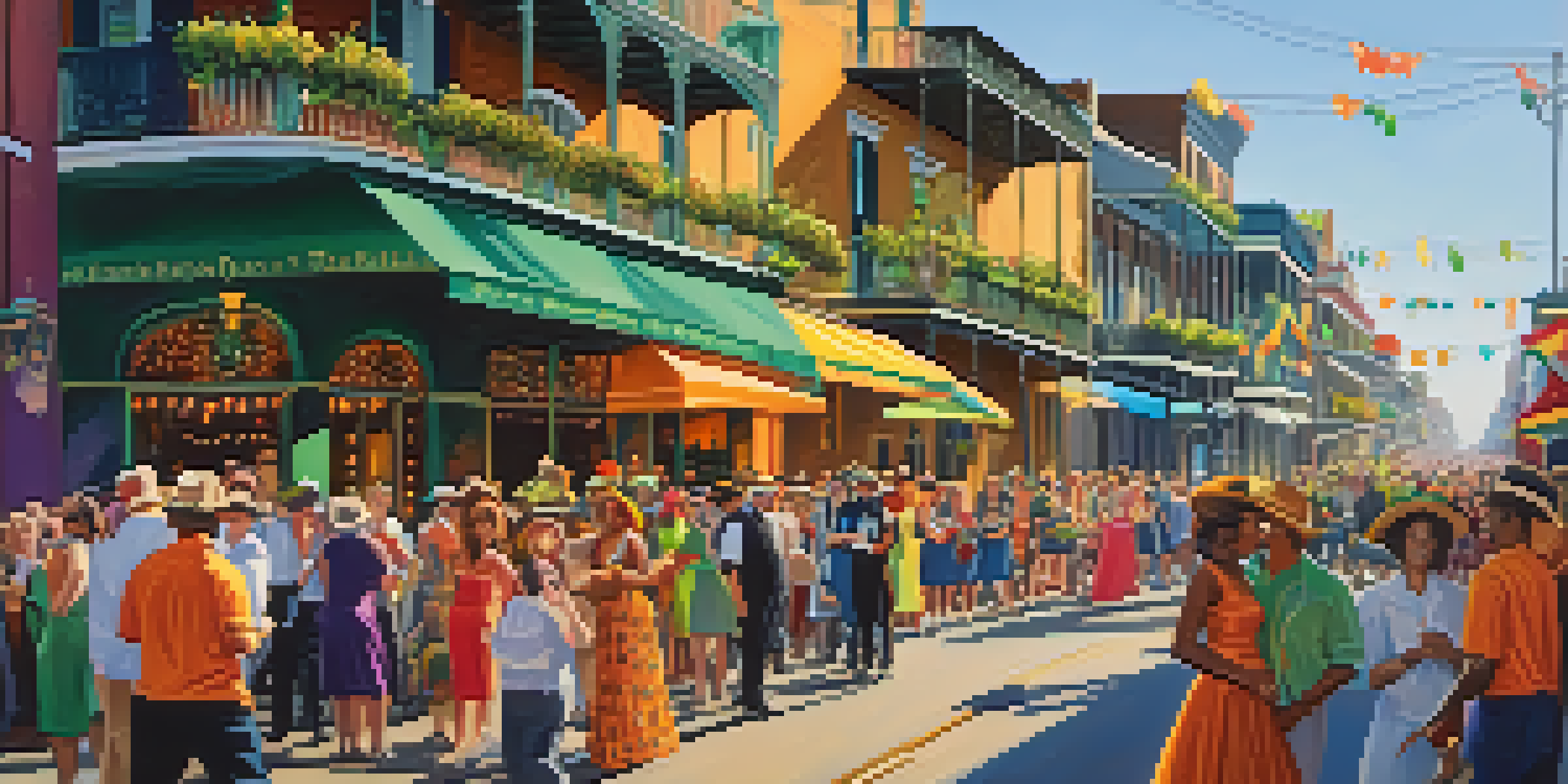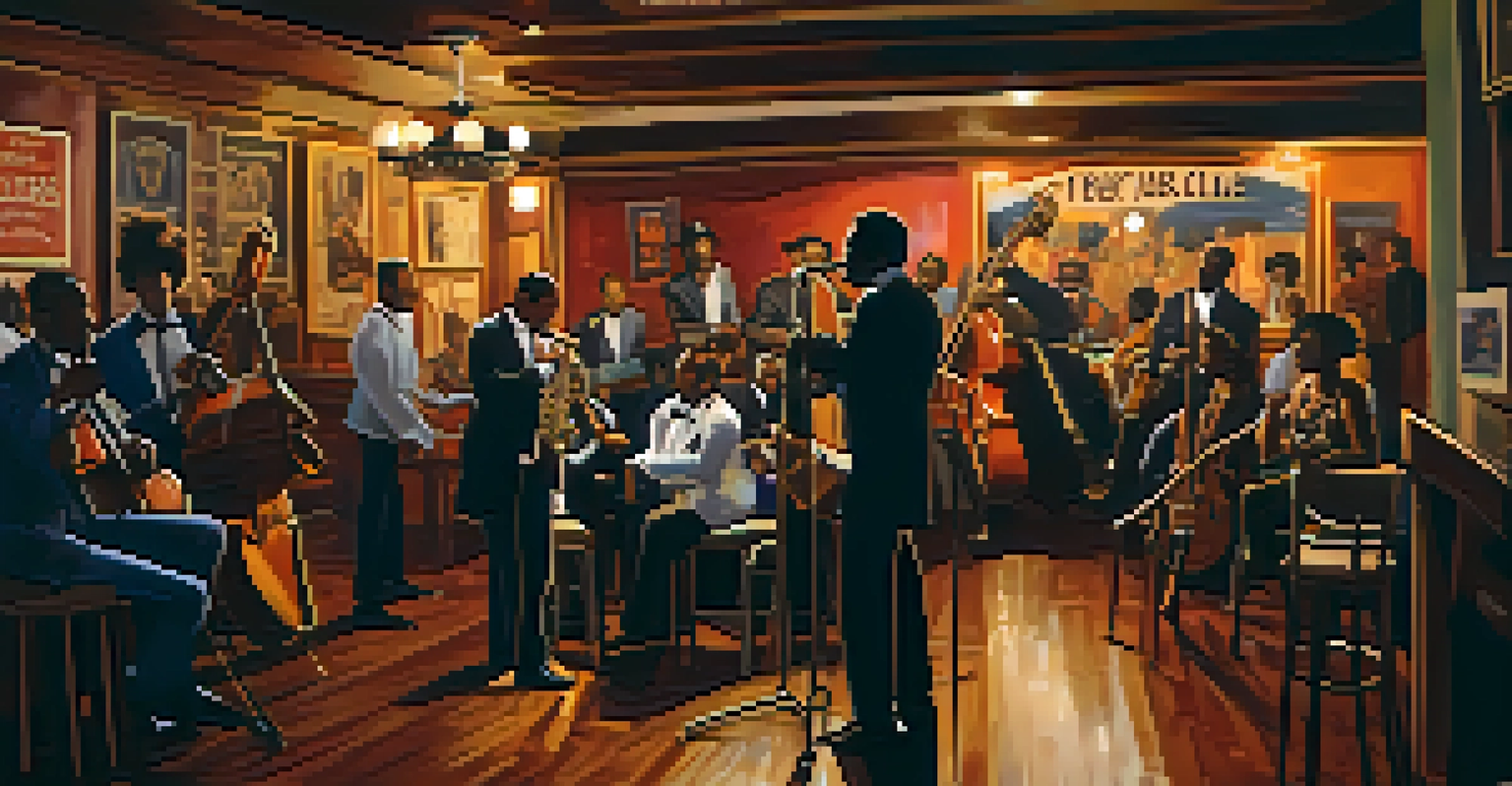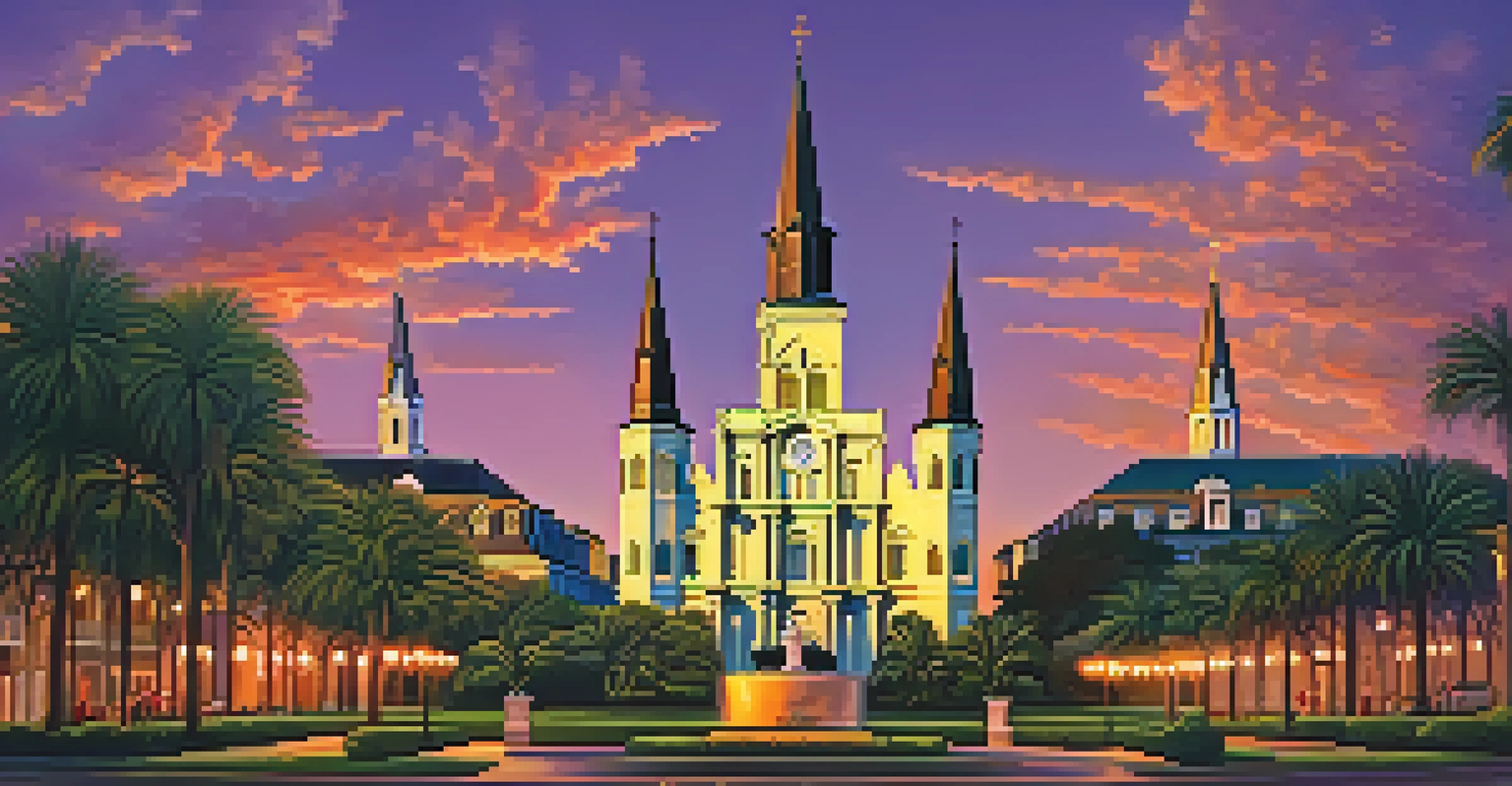The Cultural Evolution of New Orleans Through the Ages

The Birth of New Orleans: A Melting Pot of Cultures
New Orleans was founded in 1718 by French colonists, setting the stage for a unique cultural blend. Its strategic location near the Mississippi River made it a hub for trade and immigration, inviting influences from various cultures. The original settlers, along with Spanish and African populations, contributed to a rich tapestry of traditions and customs that define the city today.
New Orleans is like a big ol’ pot of gumbo. You throw in a little bit of this, a little bit of that, and you get a beautiful mix of flavors.
As the city grew, it became a sanctuary for diverse groups, including Creoles, who brought their own distinct French, Spanish, and African heritages. This confluence of cultures led to the emergence of unique culinary traditions, music styles, and social practices that we associate with New Orleans today. The flavors of gumbo, jambalaya, and beignets are just a few delicious examples of this cultural amalgamation.
Thus, the birth of New Orleans wasn't just about geography; it was about the mingling of people and ideas, which laid the groundwork for its vibrant cultural evolution. This early melting pot paved the way for the city's rich history and the traditions that continue to thrive.
The Impact of Colonial and Revolutionary Eras
The colonial era brought significant change to New Orleans, particularly during Spanish rule from 1763 to 1800. The Spanish influence can be seen in the city's architecture, language, and legal systems, which incorporated elements of Spanish law and culture. This period also saw the establishment of the famous French Quarter, with its narrow streets and vibrant buildings that still draw tourists today.

The American Revolution further complicated the cultural landscape, as many residents had to navigate their identities amid shifting allegiances. The 1803 Louisiana Purchase marked a significant turning point, as New Orleans became part of the United States, leading to new waves of settlers and cultural influences. This transition also introduced American customs, blending them with the existing French and Spanish traditions.
Cultural Melting Pot of New Orleans
New Orleans' rich cultural identity stems from the blending of French, Spanish, African, and Creole influences that shape its traditions and customs.
During these transformative years, the city's identity became increasingly multifaceted, setting the stage for the diverse cultural heritage that would continue to evolve. The fusion of these influences enriched New Orleans' social fabric, making it a unique locale where various traditions coexisted.
The Birth of Jazz: A Cultural Revolution
The early 20th century saw the birth of jazz, a genre deeply rooted in the cultural soil of New Orleans. This revolutionary music style emerged from African American communities, blending blues, ragtime, and brass band traditions. Iconic figures like Louis Armstrong and Jelly Roll Morton played pivotal roles in popularizing jazz, showcasing the city's musical prowess to the world.
Jazz is the sound of surprise.
Jazz wasn't just music; it became a form of expression for the struggles and triumphs of the African American experience. The lively clubs of Storyville, known as the city's red-light district, became the breeding ground for this new sound, attracting musicians and audiences alike. The improvisational nature of jazz reflected the city's spirit, allowing artists to showcase their creativity and resilience.
As jazz spread beyond New Orleans, it carried the city's cultural essence with it, influencing countless musicians and genres worldwide. Today, the legacy of jazz remains a cornerstone of New Orleans' identity, celebrated annually during events like Jazz Fest, illustrating how music can evolve and connect people across generations.
The Influence of Mardi Gras on Local Culture
Mardi Gras is perhaps one of the most famous cultural celebrations in New Orleans, with roots tracing back to the early 18th century. Initially a Catholic tradition marking the start of Lent, it has transformed into a vibrant festival that embodies the city's spirit. The parades, colorful costumes, and lively music create an atmosphere of joy and revelry, drawing millions of visitors each year.
The celebration is not just about the festivities; it also reflects the city's diverse history. Krewes, or social organizations, play a significant role in organizing parades, each with its own unique themes and traditions. These krewes often pay homage to the city's cultural heritage, showcasing elements from its French, Spanish, Creole, and African roots.
Jazz: A Symbol of Cultural Expression
The birth of jazz in New Orleans exemplifies the city's vibrant spirit, showcasing its musical heritage and the resilience of its African American community.
Mardi Gras has become a symbol of resilience and community, uniting people from all walks of life in a shared celebration of culture. The festival exemplifies how traditions can evolve while remaining deeply rooted in the city's identity, making it a quintessential part of New Orleans' cultural narrative.
The Resilience of New Orleans Through Adversity
New Orleans has faced its fair share of challenges, from natural disasters to economic downturns, yet its cultural resilience shines through. The devastating impact of Hurricane Katrina in 2005 serves as a poignant example of this spirit. While the storm displaced many residents and caused immense destruction, it also ignited a renewed sense of community and determination among those who remained.
In the aftermath, artists, musicians, and chefs banded together to preserve and revitalize the cultural scene. Local musicians took to the streets, playing to lift spirits and keep the city's musical traditions alive. This collective effort not only helped rebuild the city but also reinforced New Orleans' identity as a cultural capital.
The city's ability to bounce back from adversity is a testament to its rich heritage and the strength of its people. Today, New Orleans continues to celebrate its culture with pride, ensuring that the stories and traditions of the past remain alive for future generations.
Modern Influences: A Blend of Old and New
In recent years, New Orleans has seen a resurgence of interest in its cultural heritage, attracting a new generation of artists and innovators. This modern wave has infused traditional practices with fresh perspectives, resulting in a dynamic cultural landscape. From contemporary art galleries to innovative cuisine, the city embraces both its past and present.
The culinary scene is a prime example of this blend, with chefs experimenting with traditional recipes while incorporating global influences. You can find classic dishes like gumbo being reimagined with international flavors, creating a culinary fusion that reflects the city's evolving identity. This experimentation keeps the culture alive and invites new audiences to engage with it.
Mardi Gras: Celebration of Diversity
Mardi Gras embodies the rich history and diverse cultures of New Orleans, uniting people through joyous festivities and traditional krewes.
Furthermore, the digital age has opened up new avenues for artists and musicians to share their work, reaching audiences far beyond New Orleans. Social media platforms and streaming services allow local talents to showcase their creativity, ensuring that the city's cultural evolution continues to thrive in the modern world.
The Future of New Orleans' Cultural Landscape
As we look to the future, the cultural landscape of New Orleans remains an exciting and ever-evolving tapestry. The city’s commitment to preserving its rich heritage while embracing innovation ensures that its cultural identity will continue to flourish. Education and community engagement play vital roles in this journey, fostering a deeper appreciation for the traditions that define New Orleans.
Local organizations are actively working to promote cultural awareness and inclusivity, ensuring that diverse voices are heard and celebrated. By nurturing the next generation of artists, musicians, and chefs, New Orleans is preparing to pass on its cultural legacy to future custodians. Festivals and educational programs aim to instill pride in the city’s cultural roots, making them accessible to all.

Ultimately, the future of New Orleans' culture lies in its ability to adapt and grow while maintaining its unique essence. With a rich history as its foundation, the city stands poised to continue its vibrant cultural evolution, inviting everyone to experience the magic that is New Orleans.